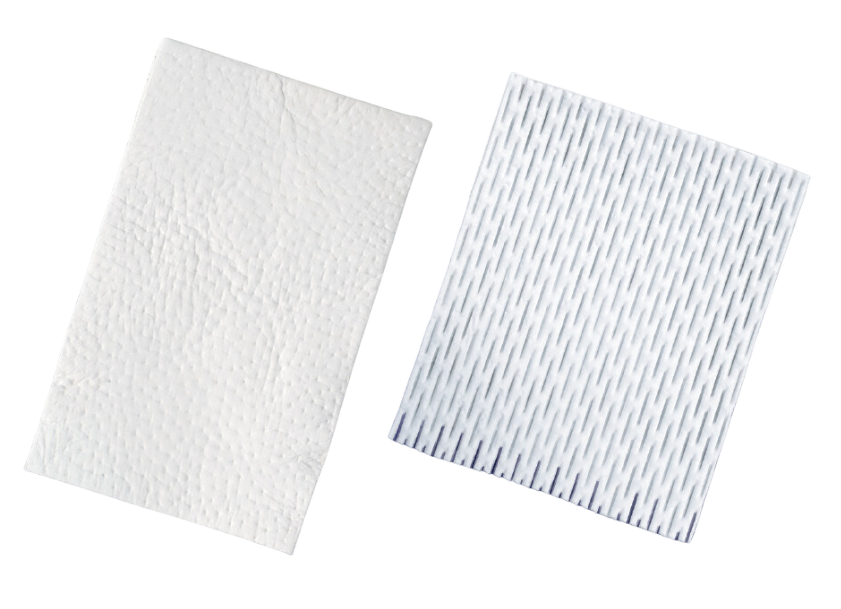
Sterile, Room Temperature Human Dermis Graft
STERILE
Terminally sterilized to a Sterility Assurance Level (SAL) 10-6 Via the Tutoplast Process
BIOCOMPATIBLE
- Preserved vascular channels
- Preserved key components of the native matrix
- Revascularization evident in as early as 7 days in an animal model
CONVENIENT
- Five year shelf life
- Simple single step rehydration


The Tutoplast Process is a validated chemical sterilization methodology specifically developed to sterilize and preserve tissue for implantation.
TUTOPLAST PROCESS
Overall the structure, biomechanics and remodeling characteristics of the implant are maintained.
THOROUGHLY PENETRATES TISSUE
Osmotic treatments disrupt cell membranes to allow for full penetration of the graft.
VALIDATED VIRAL INACTIVATION
- Ability to inactivate or remove HIV, hepatitis, fungi, and spores
- Validated by individual tissue type based on most difficult case testing using most difficult to kill organisms
Derm-Maxx® Dermal Matrix at a Glance
Osmotic, oxidative and alkaline (if indicated) treatments break down cell walls, inactivate pathogens, and remove bacteria. Solvent dehydration allows for room-temperature storage of tissue without damaging the native tissue structure. Low-dose gamma irradiation ensures a sterility level (SAL) of 10-6 of the final packaged graft.

ALKALINE TREATMENT
Removes cells and lipids
which
interfere with healing.


ALKALINE TREATMENT
Removes cells and lipids which
interfere with healing.


OSMOTIC TREATMENT
Inactivates pathogens and removes
bacteria.


OXIDATIVE TREATMENT
Inactivates pathogens and removes
bacteria.


SOLVET TREATMENT
Removes water from tissue, preserves the natural tissue
matrix and allows for room-temperature storage without
damaging the native structure.


IRRADIATION
Low-dose irradiation produces a terminally sterile graft,
while preserving structural integrity.

Pre-Processed vs. Tutoplast Processed Human Dermis
PRE-PROCESSED HUMAN DERMIS
Note presence of intact epidermis.
TUTOPLAST PROCESSED HUMAN DERMIS
Note epidermis has been removed and underlying matrix has been preserved.
PRE-PROCESSED HUMAN DERMIS
Note the presence of cellular debris throughout (purple cell nuclei).
TUTOPLAST PROCESSED HUMAN DERMIS
Note the absence of cellular debris and the intact tissue matrix.
Wound Care Cases
DIABETIC FOOT ULCER
Patient presented with a diabetic ulcer with exposed tendon and bone on the dorsal aspect of the foot. The surgeon used multiple grafts to cover the entire surface of the wound. At three weeks the wound showed a decrease in wound depth and significant granulation tissue present.

INITIAL
PRESENTATION

GRAFT
APPLICATION

3
WEEKS
INSECT BITE
Patient presented with an infected insect bite with exposed tendon and bone on the dorsal aspect of the foot. The wound required two graft applications. At 10 weeks the wound showed 70 percent decrease in size and 80 percent granulation tissue coverage.

INITIAL
DEBRIDEMENT

Application

10
WEEKS
BIOCOMPATIBILITY
IN-VIVO ANIMAL MODEL STUDY*
The graft functioned successfully as a scaffold and is fully incorporated and remodeled by the host tissue.

DAY 1
Beginning of cellular infiltration of the graft by host tissue.

DAY 7
Vascularization evident, invasion of fibroblasts and other cells found in normal healing cascade of the graft by host tissue.

WEEK 8
Difficult to distinguish implant from host tissue; graft is well incorporated.

WEEK 16
Nearly complete incorporation and remodeling of the graft has occurred
*Performance data from animal studies may not be representative of performance in humans.
Reimbursement
HCPCS CODE FOR DERM-MAXX® DERMAL MATRIX
CMS has indicated that these brand-specific HCPCS codes are applicable for all sites of service that use the Derm-Maxx® Dermal Matrix.
CODE DESCRIPTION Q4238 DERM-MAXX®, PER SQUARE CM
Use of the HCPCS Q-code does not guarantee payment. You should select the most appropriate codes for the procedures performed. Coding practices will vary by the site of care, patient condition, range of services provided, local carrier instructions, and other factors. The decision about how to complete a reimbursement claim form, including billing amounts, is exclusively the responsibility of the provider. Coding regulations are subject to change at any time.
ORDERING
INFORMATION
- Code Description
- MDRMF-11 Derm-Maxx® Fenestrated Dermal Matrix 1cm x 1cm
- MDRMF-22 Derm-Maxx® Fenestrated Dermal Matrix 2cm x 2cm
- MDRMF-24 Derm-Maxx® Fenestrated Dermal Matrix 2cm x 4cm
- MDRMF-44 Derm-Maxx® Fenestrated Dermal Matrix 4cm x 4cm
- MDRMF-48 Derm-Maxx® Fenestrated Dermal Matrix 4cm x 8cm
- MDRMF-510 Derm-Maxx® Fenestrated Dermal Matrix 5cm x 10cm
- MDRM-11 Derm-Maxx® Dermal Matrix 1cm x 1cm
- MDRM-22 Derm-Maxx® Dermal Matrix 2cm x 2cm
- MDRM-24 Derm-Maxx® Dermal Matrix 2cm x 4cm
- MDRM-44 Derm-Maxx® Dermal Matrix 4cm x 4cm
- MDRM-48 Derm-Maxx® Dermal Matrix 4cm x 8cm
- MDRM-510 Derm-Maxx® Dermal Matrix 5cm x 10cm
Explore our Entire Product Line
Autologous Advanced Biologics
Advanced Synthetics
About Royal
Royal is a pioneering leader in orthobiologic and wound care research and development. Royal’s commitment lies in delivering top-tier, innovative biologic solutions that enhance the healing process and improve patients' quality of life. Royal places patient well-being at the center of its mission, offering exceptional solutions to address a variety of complex needs.
At Royal, our mission is driven by patient-centered care, innovation and excellence, and integrity and compassion. Royal provides a comprehensive array of products tailored to meet the varied needs of the orthobiologic and wound care industry.
As a rapidly expanding force in the industry, Royal is continuously developing and launching new products and solutions that set benchmarks for quality, effectiveness, and patient outcomes. Royal’s commitment to research and innovation keeps it at the forefront of the industry, helping to shape the future of healthcare and improving lives.




